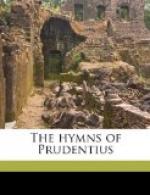Then, grasping in strong hand the prophet’s
hair,
He bears him gently through the rushing
air,
Still burdened with the platter’s
savoury load,
Till o’er the lions’ den at
last they stayed
And straightway to the starving youth
displayed
The food thus brought, by
God’s good grace bestowed.
“Take this with joy,” he said,
“and thankful feed,
The bread that in thy hour of direst need,
By the great Father sent,
Christ’s angel brings.”
Then Daniel lifts his eyes to heaven above
And, strengthened by the wondrous gift
of love,
“Amen!” he cries,
and Alleluia sings.
Thus, therefore, by Thy bounties now restored,
Giver of all things good, Almighty Lord,
We render thanks and sing
glad hymns to Thee:
Though prisoned in an evil world we dwell
Where sin’s grim tyrant rules, Thou
dost repel
With sovran power our mortal
enemy.
He roars around us, and would fain devour,
Grinding his angry teeth when ’gainst
his power
In Thee alone, O God, we still
confide:
By evil things we are beset and vexed,
Tormented, hated, harassed and perplexed,
Our faith by cruel suffering
sorely tried,
Yet help ne’er fails us in our time
of need,
For Thou canst quell the lions’
rage, and feed
Our hungry spirits with celestial
fare:
And if some soul no meagre taste would
gain
Of that repast, but thirstily is fain
Full measure of the heavenly
sweets to share,
He by the holy seers of old is fed,
And shall partake the loyal reapers’
bread
Who labour in the eternal
Master’s field:
For nothing sweeter than the Word can
be
That fell from righteous lips, once touched
by Thee,
And nought can richer grace
to mortals yield.
With this sustained, though vaunting
tyranny
By unjust judgment doom us straight to die,
And starved lions rush these limbs to tear;
Confessing ever Thine Eternal Son,
With Thee, Almighty Father, ever one,
His cross with faith unshaken will we bear.
V. HYMNUS ad incensum LUCERNAE
Inventor rutili, dux bone, luminis,
qui certis vicibus tempora dividis,
merso sole chaos ingruit horridum,
lucem redde tuis Christe fidelibus.
Quamvis innumero sidere regiam 5
lunarique polum lampade pinxeris,
incussu silicis lumina nos tamen
monstras saxigeno semine quaerere:
Ne nesciret homo spem sibi
luminis
in Christi solido corpore conditam,
10
qui dici stabilem se voluit petram,
nostris igniculis unde genus venit.
Pinguis quos olei rore madentibus
lychnis aut facibus pascimus aridis:
quin et fila favis scirpea floreis
15
presso melle prius conlita fingimus.
Vivax flamma viget, seu cava
testula
sucum linteolo suggerit ebrio,
seu pinus piceam fert alimoniam,
seu ceram teretem stuppa calens bibit.
20




